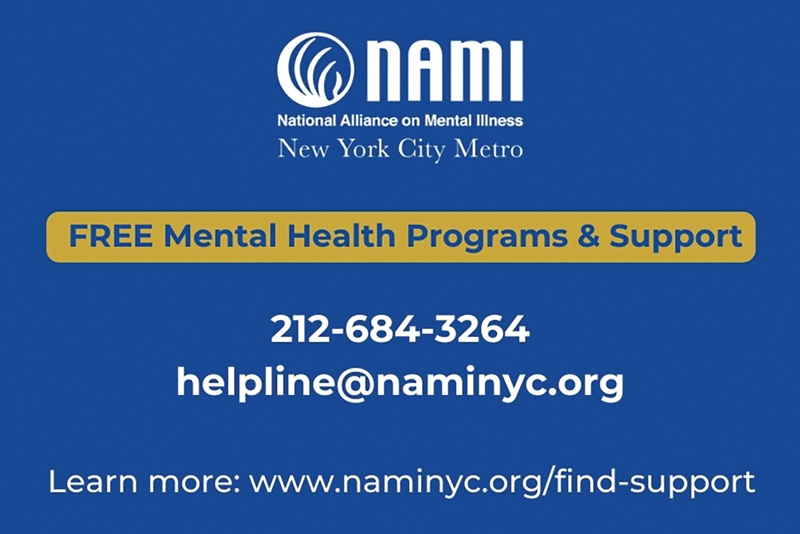At NAMI-NYC, we often say 1 in 5 of us is affected by mental illness, and the other 4 are family, friends, neighbors, and colleagues. We are ALL impacted by mental illness. Most interventions are for the individual, but it’s critically important to remember the first ring around the person – their friends and family.
NAMI-NYC is the only non-profit offering free mental health programs and support directly to family members caring for a loved one with mental health challenges. Together, we offer peer-led, peer-run classes, 40 support, and social groups, a Helpline in 180 languages, family mentoring, and more to help New Yorkers with mental illness—and their families—on the road to recovery.
At NAMI-NYC, we also focus on breaking the mental health stigma, especially in underserved communities. Due to our unique position to assist families, we wanted family support to shine in our Emmy-winning PSA video for Hispanic/Latino New Yorkers. The Hispanic/Latino community specifically faces significant stigma surrounding mental illness, as well as challenges accessing care. Language barriers and the lack of bilingual practitioners are just a few of the reasons many Hispanics/Latinos are left without the support they need. In addition, the COVID-19 pandemic has disproportionately impacted this community.
Despite these challenges, NAMI-NYC has made efforts to address mental health stigma and improve access to care through its Spanish language programs and this campaign. At NAMI-NYC, it’s more than offering translation and interpretation, but developing customized culturally responsive programs, led and run by volunteers, and in this case, community members who identify as Hispanic/Latino.
The success of the PSA project is also largely attributed to thorough research and community engagement. Through extensive field studies, NAMI-NYC gained valuable insights into the attitudes and needs of the Hispanic/Latino community regarding mental health. This research guided the development of the PSA video and informed the organization’s outreach and distribution strategy. We conducted the interviews in English and Spanish on the streets of New York City. These interviews were audio recorded, and then we organized the data by theme, age, race, and zip code. Some of these insights included:
“I don’t talk to my family about mental health. I don’t know if it’s a cultural obstacle, but both my parents are immigrants, and they never really held that kind of space for open dialogue.”
“I don’t really talk about my feelings and emotions that are the most vulnerable with my parents.”
“…when I’m feeling something negative, something dark inside of me, that’s when I talk to my psychologist, or I also speak with God spiritually.”
We were ready to shoot our PSA from this programmatic expertise and field research. The narrative unfolds, depicting the strained relationship between a mother and daughter due to her daughter’s mental health challenges. The mother realizes she, too, needs support to navigate her role as a caregiver, parent, and family member. The video underscores the crucial need for caregivers to prioritize their well-being. Family members can’t change their loved ones. Instead, family members must learn, change, and grow in a way that impacts the entire family dynamic. At NAMI-NYC, with greater knowledge and support, caregivers are empowered to better understand and manage their roles, fostering healthier relationships with their loved ones.
Once the PSA was complete, NAMI-NYC deployed a comprehensive distribution strategy. We curated a toolkit for community members to share the PSA, including email templates, social media posts, posters, and more. We utilized organic channels such as our website landing page, monthly newsletter, standalone emails in English and Spanish, as well as social media posts. Local media outlets aired our PSA, including CUNY TV, BRIC, Queens Public Television, Manhattan Neighborhood Network, BronxNet, and FY EYE. Our outreach to more than 25 community organizations serving Hispanic/Latino New Yorkers resulted in a deeper partnership with the Brooklyn Public Library. Together, we hosted a community conversation and in-person focus group on the PSA, as well as a mental health resource fair at their central branch.
To measure the impact of our PSA project, we hosted three community discussions, including pre- and post-surveys and focus groups, two virtually and one in-person at the Brooklyn Public Library. The project’s impact exceeded expectations, significantly reducing mental health stigma observed among participants after viewing the PSA video. Using our pre-/post-surveys, we saw a significant increase in the likelihood of seeking help in case of a mental health emergency, willingness to speak to others about mental health challenges, and openness to connecting to a supportive mental health community like NAMI-NYC. We also saw a dramatic shift in attitudes towards people living with mental illness before and after the PSA, including acknowledgment of mental health stigma for this group and that mental illness could affect anyone.
For other organizations looking to implement successful anti-stigma campaigns, we recommend conducting thorough research and remaining open to all feedback and insights from the community. Although we focused on the Hispanic/Latino community, we kept our interviews open to anyone who wanted to chat. We authored an original report detailing Black, brown, and AAPI community findings. Many of these individuals shared the difficulties of talking about mental health in immigrant families. As a result, this PSA now stands as a foundational resource for future programming and campaigns, which could be tailored, for example, to New Yorkers in mono-lingual Chinese or Arabic communities.
For over 40 years, NAMI-NYC has been a lifeline for individuals and families affected by mental illness. We urge you to utilize our PSA, available at www.naminyc.org/psa, to spread awareness and connect individuals with the necessary resources. Whether you’re embarking on your own PSA project or seeking guidance, we welcome your questions and are eager to share our insights and feedback. To get in touch, visit www.naminyc.org/helpline.
This project was funded by the New York State Office of Mental Health and the New York State Tax Check-off Funds for Mental Health Stigma Reduction.








